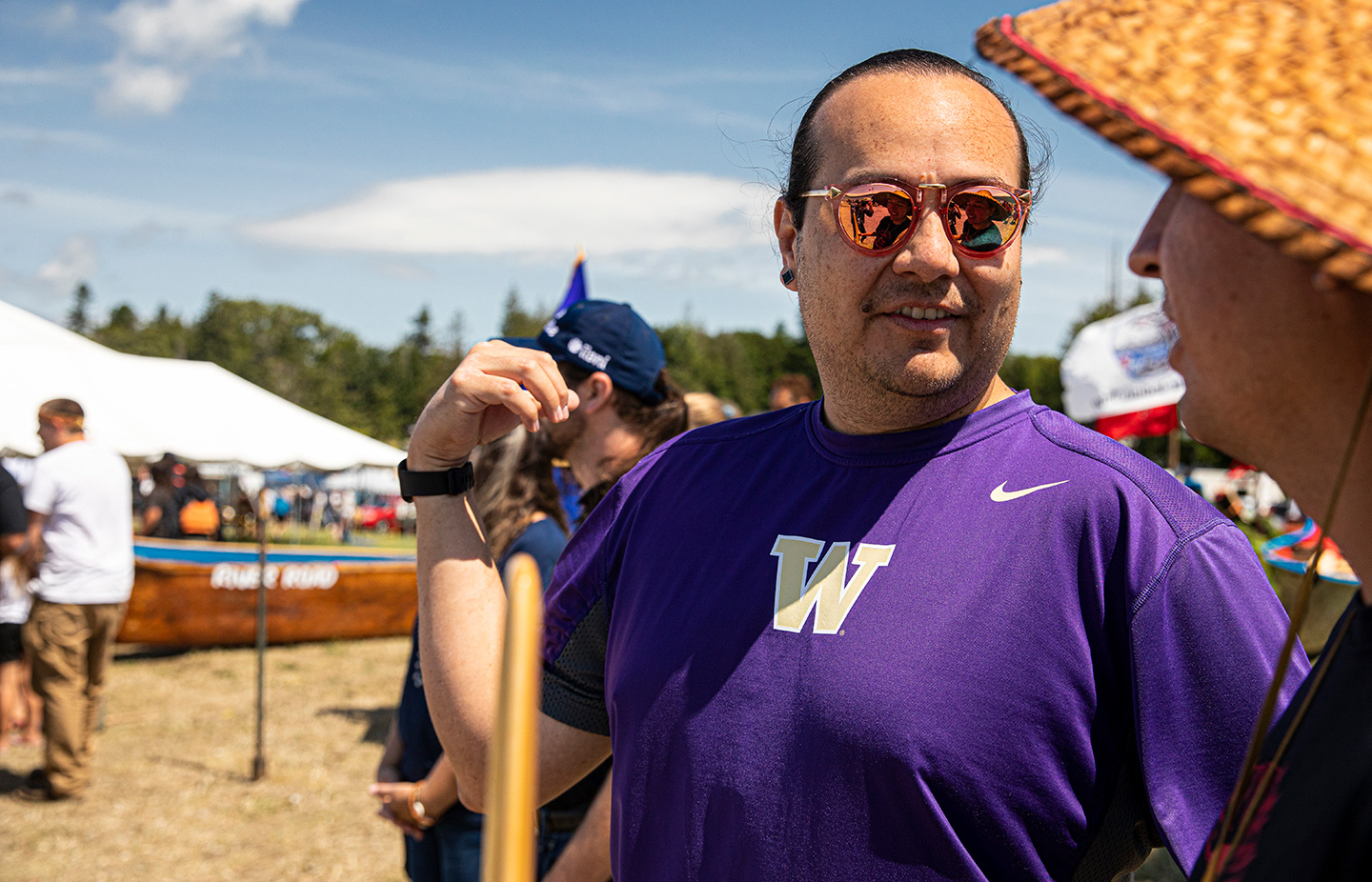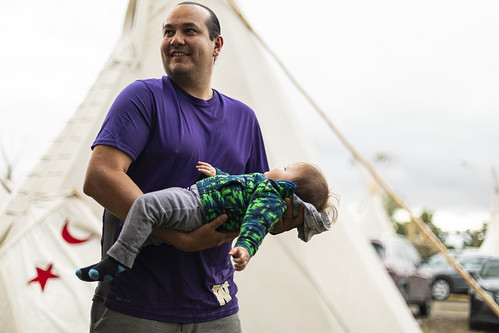In Iisaaksiichaa Ross Braine’s family, college education is an obligation, not an option. His father has a master’s degree in range science. His mother earned hers in counseling. But when a young Braine told the counselor in his rural Montana high school that he wanted to attend the University of Washington, the counselor advised him to forget it.
“He said, ‘You should do something else. Indians don’t do well in college,’” recalls Braine, this year’s iSchool Distinguished Alumni Award winner.
Braine, who earned his own graduate degree through the iSchool’s Master of Science in Information Management program in 2015, has been busting stereotypes all his life.
“I’m not a werewolf, thank you ‘Twilight.’ I’m not an Indian in the cupboard. And I’m not a redskin — a term I find absolutely disgusting,” says the wry, straight-shooting, 6-foot-3 man, a citizen of the warrior Apsaalooke (Crow) Nation. “We don’t all own casinos, we don’t all go to college for free, and I didn’t get into college because I am Native, I got in because I’m very smart.”
Smart and strategic. In his dual roles as UW tribal liaison and director of wǝɫǝbʔaltxʷ (Intellectual House), he is a master networker, negotiator, mediator, ambassador, mentor and, thanks to his iSchool studies, skilled information manager.
“He works tirelessly to ensure that American Indian and Alaska Native people see the University of Washington and the iSchool as their place, where they are welcome, where they will be supported, and where they will achieve their fullest potential. He leads with integrity, grace and unwavering commitment,” says Harry Bruce, recently retired dean of the iSchool.
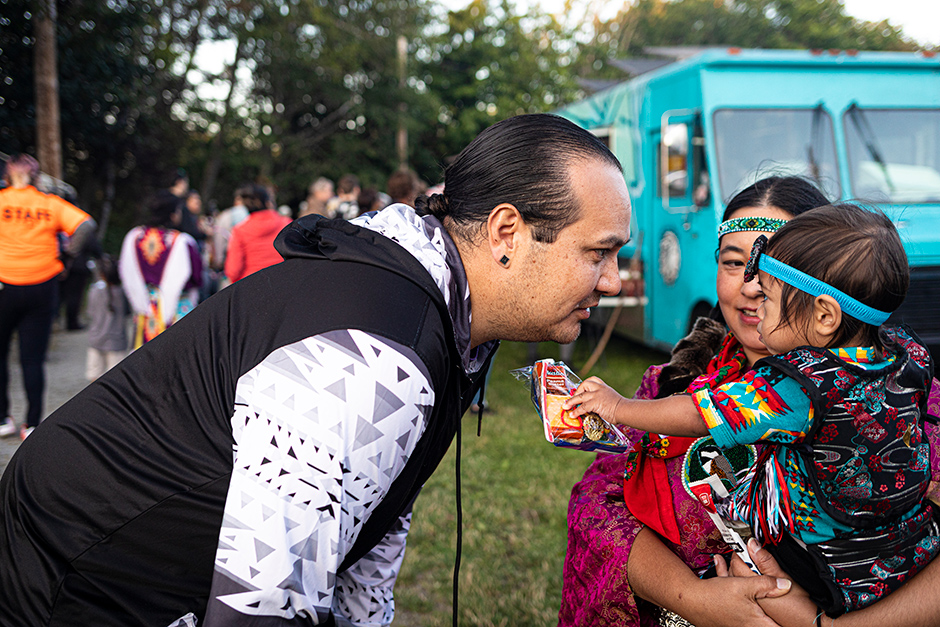
Whether fundraising or community-building, Braine knows how to work a room and keep it real, say those who’ve watched him in action.
“No matter who you are or what your story is, he will always be genuine and connect with you on a level many people would not dare to connect on,” Nataly Brockwell wrote in a nomination letter that helped earn Braine a UW 2015 Distinguished Staff Award. Brockwell was his co-worker at the UW Office of Minority Affairs & Diversity, which supervises the director position in wǝɫǝbʔaltxʷ.
The wǝɫǝbʔaltxʷ (wah-sheb-altuh) Braine directs is a handsome cedar longhouse-style gathering space on campus that is focused on preparing American Indian and Alaska Native students for leadership roles in their tribal communities.
“Tribes say, ‘We’re sending our students to you and you need to send them back to run our enterprises, our law department, our forestry program, our fisheries, and be our biologists.’ I hear it from every single tribe,” says Braine, who was given the name Iisaaksiichaa (ee-sox-ih-jeh) by his clan uncle. “The name translates as ‘good lad’ or ‘good young fella.’ But I’m neither good nor young,” quips the 37-year-old.
“I have a working knowledge of every single one of our tribes, a Rolodex with what we talked about and what we need to be working on with the UW.”
Braine’s warm diplomacy works on-campus and off. He travels regularly, attending tribal meetings and community events including powwows (he joins in dancing, in a style known as “Crow Style” Men’s Traditional) and tribal paddles (he keeps to shore: “I’m not an ocean-going Indian”). He keeps an impressive taxonomy, a skill he learned in his iSchool MSIM studies, to manage a large trove of information about Native students and the more than 60 Northwest tribes he works with.
“I have a working knowledge of every single one of our tribes, a Rolodex with what we talked about and what we need to be working on with the UW.”
He connects many worlds. If university researchers come to him with a proposal involving a certain tribe, he makes sure the tribe knows about it and has the final say on whether it’s a go. If the researchers don’t come to him first, he finds out anyway: “The tribes always call me. ‘What do you know about this research group?’”
Many tribal citizens are wary of academics after decades of what they see as thievery of their information in the interest of research, says Braine. “I tell them, ‘I know what universities have done in the past, and I’m working on it with our folks here at the UW.’”
Braine’s dedication to tribes and tribal students is fierce. “I’m always going to pick my people first. You can yell at me, fire me, whatever you want, but when I leave the UW I have to go back to my people. I stand very firmly in my ways, the Apsaalooke ways.”
Braine’s ties to the iSchool run deep. He provided important input for the school when it instituted a new strategic focus, Native North American Indigenous Knowledge, which concentrates on the study and celebration of Native communities as they intersect with 21st-century information and technology. The iSchool is now one of the only information schools in the country with a growing Native faculty and indigenous knowledge as part of its curriculum.
Indigenous knowledge is not necessarily something written on paper and archived, explains Braine. It may be oral history, carried over time and kept alive by tribal members. Braine gives the example of a tribal elder who was present when a particular tree was planted eight decades earlier. Walking the woods, the elder points to the tree and explains how it came to bend a certain way, how it was burnt, twice, and survived. That itself is a valuable information system, Braine says. “Our elders are a wealth of knowledge. I call them my library.”
He was heavily recruited to the iSchool’s MSIM program by Harry Bruce and Cheryl Metoyer, iSchool associate professor emerita and Eastern Band Cherokee.
“I knew immediately that Iisaaksiichaa had a strong heart. I knew immediately he was intelligent. I knew he was sincere, I knew he could be trusted, and I knew he was a careful thinker,” says Metoyer, one of the first Native American Ph.D. graduates in library and information science in the country. “He asks a lot of questions, insightful questions.”
Even before he signed on for the MSIM, Braine was part of the iSchool’s Indigenous Information Research Group, a first-of-its-kind gathering of Native scholars and students focused on tribal rights and managing information within tribal contexts. Braine contributed valuable boots-on-the-ground knowledge about Northwest tribes and their information needs, says Metoyer, who founded the group and now directs its next iteration, iNative.
“He awakened faculty and students to the fact that some of the solutions they were offering just wouldn’t work in a tribal setting,” she says.
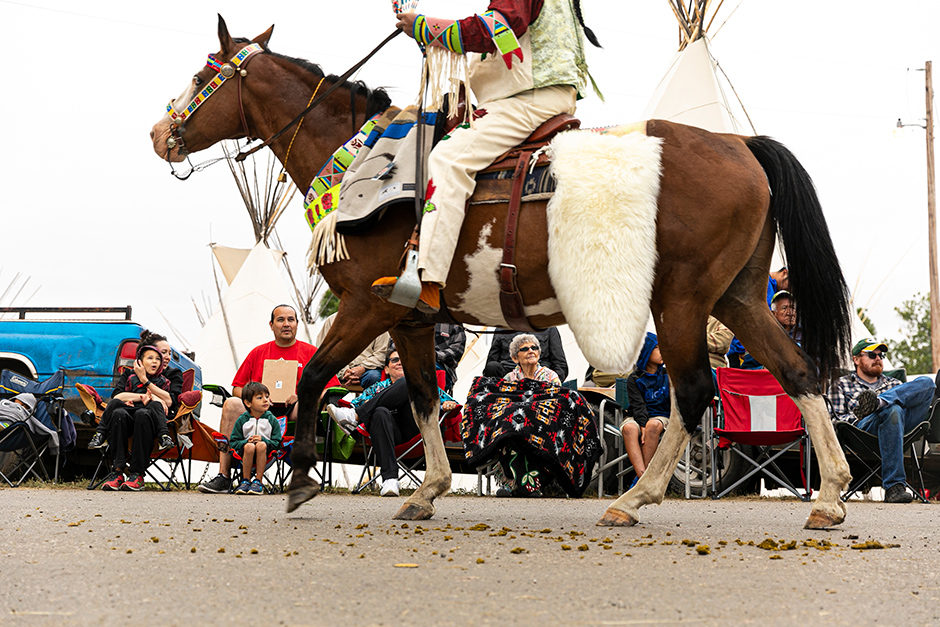
One assumption is that all tribes have internet access. They don’t. Surveys show just over half of Native Americans living on reservations or other tribal lands have access to high-speed internet service. “There is a huge digital divide of access,” says Braine.
Even if they do have access, however limited, tribes struggle with complex questions about how to share, collect, and protect information in the unruly wilds of the internet. Tribes are sovereign nations. They own their data. But how do they control it?
“Some of our tribes do not want photos taken of their events or recording of their songs and stories. As sovereign nations, that information belongs to us. And a lot of times, we do not want to share that,” says Braine. “Sometimes, we need no technology.”
Braine severely limits his own daily data intake. Though he’s happy to tune in to YouTube or play a game of “Marvel Strike Force,” he refuses to engage in Facebook, Twitter, Instagram and other social media. He has seen too many people arguing and slinging insults online. “I just don’t like it,” he says. “I like my fake privacy — my imaginary fake privacy.”
Braine plays as hard as he works. He likes to dive for crab, preferably in just his swim trunks, despite dangerously chilly Northwest waters. He likes to fish from his old duck boat but puts the fish back. He loves basketball and plays a lot of it. “If I could have done anything, I would be a professional basketball player, but I’m too short for the NBA,” he says, smiling inside his office in the wǝɫǝbʔaltxʷ.
There are emerald-colored studs in his ears and a ponytail pulled low to the back of his head. A tattoo with three chevrons marks his inner wrist. The chevrons represent him; his brother, who served in the Air Force and attended Boise State University; and his sister, who is also pursuing graduate studies at the UW.
For Braine, family, present and past, are all-important. He introduces himself as the eldest son to parents Tim and Nita; husband to “amazing, beautiful, strong” Megan, a pharmacist; and father of their two boys, Michael and baby Thomas. He is not only a citizen of the Apsaalooke nation, a member of the Big Lodge clan, and a member of the Night Hawk Warrior society — “all Crow” — he is also Northern Cheyenne and Sioux.
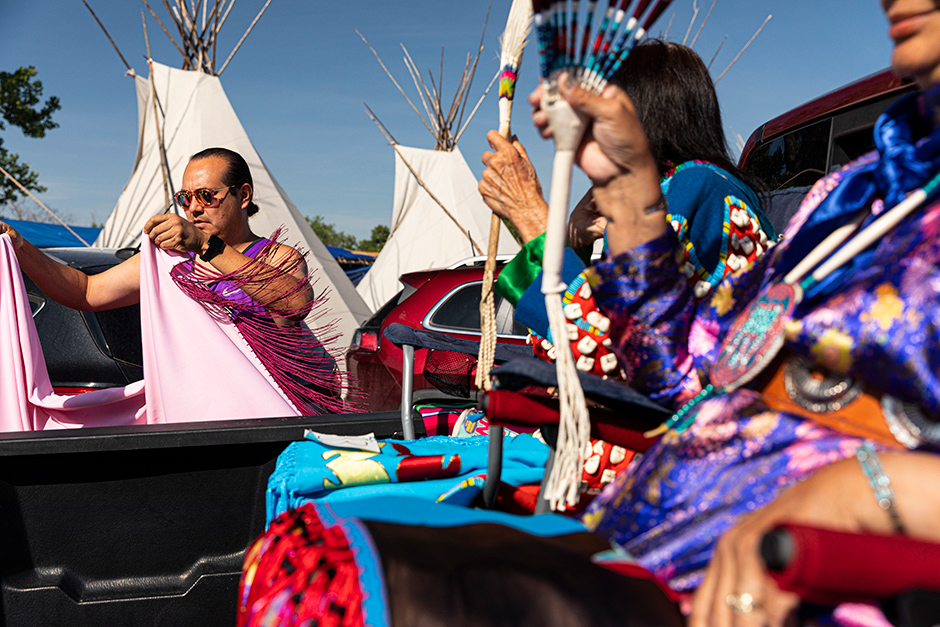
He grew up on reservations in Montana, riding horses and, in the winter, sliding over snow in a horse-drawn sleigh. “We only had one television station, so we just played outside all the time.”
His parents pulled up roots and moved the family to Washington to boost their son’s chances of getting into the UW. The day the acceptance letter arrived was the first time Braine had seen one of his achievements make his father cry.
As an undergraduate, Braine decided to concentrate his studies on forestry, completing his undergraduate degree in the field. But the profession wasn’t a fit.
“I had really loved the woods all my life, but going into them for work changed everything. I was like a crop manager versus listening to the birds, hearing the walking of animals,” he says. “They saw the forest as a product; I kept saying: ‘The forest has a spirit.’”
Early in those undergraduate years, he brought his energy to activism and protest, leading the fight on campus for justice for sovereign tribal peoples. In 2002, he took on the official role of American Indian Student Commission director, representing all the American Indian and Alaska Native students on campus through the Associated Students of UW. “That’s when I first started to get in The System,” he says.
People took notice of the bright young activist. One was his soon-to-be mentor Julian Argel, a member of the Tsimshian and Haida tribes, who was then serving as tribal liaison. Argel began grooming Braine for the liaison role. This job was a fit.
“I didn’t wake up and say ‘I’ll be the point of contact for all the Northwest tribes and the University of Washington,’” says Braine. “There was never a day when I said, ‘That’s what I want to do with my life.’ It was kinda like, ‘Oh, man, no one else is going to do this, and I’m good at it.’ It’s like I was predestined for it.”
"Every square inch of this building, I know by heart."
Argel had long fought for construction of a culturally representative gathering space for American Indian and Alaska Native people on campus. But it wasn’t until the 2000s that the state Legislature dedicated $3 million for project. The other $3 million came from private donations and some Washington tribes.
When Argel — “Uncle Julian” to students — died in 2012, Braine vowed to see the project to its conclusion. He became full-on project manager for wǝɫǝbʔaltxʷ, doing everything from feasibility studies and fundraising to construction punch-lists.
“I was determining where electrical outlets go and how far lights should come down. Every square inch of this building, I know by heart,” says Braine, who credits coursework in design and project management at the iSchool for helping him successfully manage human resources and grow a strong team.
A few months before the building’s official opening in March 2015, the wǝɫǝbʔaltxʷ planning and advisory group took a tour of the facility and spotted an immature bald eagle sitting in the crook of a nearby tree. It was eating a crow. “We all said, ‘That’s Julian, man.’ I cried then. In our tribe, in our way, crying is allowed. It’s not male or female. We are expected to express our emotions, so I cried and I cried a lot.”
Four years later, with fundraising for a second longhouse-style building in the works, wǝɫǝbʔaltxʷ has become the gathering place Braine’s mentor imagined, open to Natives and non-Natives alike for study, classes and celebrations. With a great hall and a large kitchen, it hosts more than 150 events a year, including basket-weaving classes, gourd dancing lessons, indigenous cooking workshops, the UW president’s annual tribal leadership summit, and, for students, intensive professional development sessions in skills such as resume-building and grant-writing.
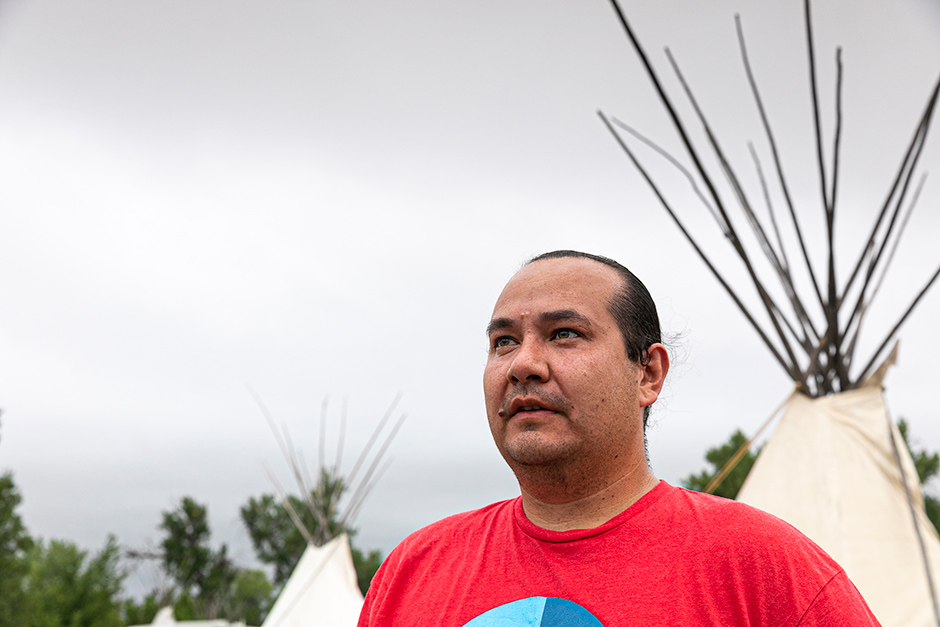
wǝɫǝbʔaltxʷ is also the site of the yearly Raven’s Feast graduation ceremony for American Indian and Alaska Native students, who comprise approximately 1.2 percent of the UW student population. Braine makes sure these Native students — “my students” — graduate at rates well above national averages. “At the Office of Minority Affairs & Diversity, we circle and protect our students, whether it’s crisis intervention, suicide prevention, housing, food insecurities, or just, ‘My parents passed away and I need to get home and I don’t have any money.’”
If they need tough love, he delivers. “I say, I see you messing around, see you on the internet all the time. I don’t see you at the study tables. I say, ‘C’mon, man, get yourself together. Do what you came here to do.’”
He’s had plenty of tough love himself from mentors. He credits them with giving him a thick skin, teaching him how to say “No,” and showing him how and when to invest and fight for something. Now he’s passing it on, mentoring scores of students and colleagues.
“He helps us find what we want to do and introduces us to people and opportunities to help us grow,” says Michael Yates, the administrative assistant at wǝɫǝbʔaltxʷ and a member of the Cowlitz Indian Tribe. “He was also the officiant at my wedding. And when my little brother got into the UW, Iisaaksiichaa started mentoring him as well.”
For Braine, master networker and “good young fella,” that’s how it works. You get, you give.
